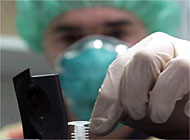WHO calls for “firewall” to protect drug research

The World Health Organisation has urged new rules to protect researchers from commercial pressure and to improve the reliability of clinical drug trials.
WHO experts say commercial interests may be threatening the objectivity of clinical evidence in the drug trials. WHO was particularly concerned about under-reporting of negative results, bias in publicizing positive results and examples of financial links between researchers and manufacturers.
Jonathan Quick, the director of essential drugs and medicines policy at WHO, says conflicts of interest on the part of researchers, inappropriate involvement of commercial sponsors in running the trials, and bias in publishing the results is undermining the credibility of the trials.
In an editorial of WHO’s monthly magazine “Bulletin”, Quick cites a number of recent examples of financial ties between researchers and manufacturers of cardiovascular drugs.
Quick said a declaration of the rights and obligations of clinical research should be created to ensure that standards are maintained. The declaration would ensure the intellectual independence of researchers, prohibit legal action by sponsors except for fraud, and protect those who “blow the whistle” on unscientific and unethical research practices.
“It is in the interest of all…including the pharmaceutical firms, that the evidence which clinical and policy decisions are based on meets the highest standards of scientific and ethical integrity”. Quick said.
Industry response
Meanwhile, the pharmaceutical industry is reluctant to implement new rules, but instead favours a self-regulatory code of conduct. The director of a Swiss association for the production of non-prescription drugs, Beat Heidig, said he sees no reason to implement a declaration that he believes would have a limited effect.
“We have been living a long time with the current system which, while not foolproof, is working well” he told swissinfo. “I see no reason to create more rules and hurdles in a process which is already difficult. It is impossible to ensure a total independence of researchers because their work is interlinked with that of the pharmaceuticals.”
However, Heidig says the larger research centres do benefit from a high level of independence and are “hardly being influenced” by the pharmaceutical industry. In Mr. Heidig’s opinion, undue influence or misuse of information has occurred occasionally, but is the prerogative of the smaller pharmaceutical companies and small research organisations which do not have “the same levels of professionalism or ethics” as the bigger players in the market.
Heidig does, however, endorse a code of conduct which could be set up and monitored by the industry. Such self-regulation has proved effective in other industries, he said. “It is possible we need some supplementary work on the industry code of conduct documents”.
swissinfo with agencies

In compliance with the JTI standards
More: SWI swissinfo.ch certified by the Journalism Trust Initiative
You can find an overview of ongoing debates with our journalists here. Please join us!
If you want to start a conversation about a topic raised in this article or want to report factual errors, email us at english@swissinfo.ch.